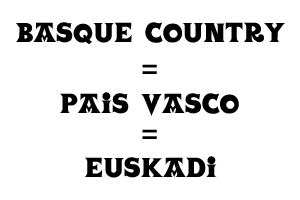The Basque Language
I don’t know if there is a Basque-language edition of Scrabble, but there really should be. Without some adjustment to the scoring system and the numbers of each letter, the game would become impossible. When you're up in that area, if you see words liberally peppered with t’s, x’s, z’s and k’s; that’s Basque! And where does this language come from? Amazingly, nobody knows.
Basque is spoken by around three-quarters of a million people, mostly in the corner of Spain known as El Pais Vasco, the remainder being in the corresponding corner of France. Its origins are the source of much mystery and speculation. It is not an Indo-European language as the other Western European languages are, and its roots have been attributed to various disparate language families. Because it bears some resemblance to Georgian, some have in the past linked it to languages from the Caucasus. Others meanwhile have found associations with the non-Arabic languages of northern Africa. Yet others think it is likely that Basque developed 'in situ' within the current Basque-language territory and somehow stayed largely uninfluenced by those surrounding it, thus making it the curious anomaly that we see today.
 Although the number of speakers is quite small, the cultural impact of the language is powerful, and there are television stations, newspapers and even websites in Basque (or Euskera, as it is in Basque itself). To the casual visitor, the most obvious presence of the language will be found in place names, which fall into several broad categories. First there are the places that are pronounced the same in Spanish and Basque but spelt differently. These vary from subtle differences like Munguía (Spanish) and Mungia, to more radical spelling differences like the province of Vizcaya (in Spanish) which becomes Bizkaia in Basque. Then there are the names which are completely different in Spanish and Basque, which are hyphenated together so you will find the place that you think of as San Sebastian referred to as Donostia-San Sebastian, or occasionally just Donostia. Finally of course there are the places that only have one name, which is obviously of Basque origin and usually multi-syllabic, like Arrankudiaga or Aizarnazabal. Biarritz in France is also a Basque name, but thankfully not quite such a tongue-twister.
Although the number of speakers is quite small, the cultural impact of the language is powerful, and there are television stations, newspapers and even websites in Basque (or Euskera, as it is in Basque itself). To the casual visitor, the most obvious presence of the language will be found in place names, which fall into several broad categories. First there are the places that are pronounced the same in Spanish and Basque but spelt differently. These vary from subtle differences like Munguía (Spanish) and Mungia, to more radical spelling differences like the province of Vizcaya (in Spanish) which becomes Bizkaia in Basque. Then there are the names which are completely different in Spanish and Basque, which are hyphenated together so you will find the place that you think of as San Sebastian referred to as Donostia-San Sebastian, or occasionally just Donostia. Finally of course there are the places that only have one name, which is obviously of Basque origin and usually multi-syllabic, like Arrankudiaga or Aizarnazabal. Biarritz in France is also a Basque name, but thankfully not quite such a tongue-twister.
As you stroll down a street in Bilbao or any other town in Euskadi, you will also pick out the distinctive style of script which seems a necessary adjunct to the language itself. Almost every shop, restaurant and bar name will appear in some variation of the script shown here on the left.
Like other Spanish minority languages, Basque did not have an easy time under the regime of General Franco but it is probably just this repression that helped to preserve it today, along with other academic interests which had being going on since the late 19th century. In order to help preserve its future by ensuring that children took up the language, the 'Ikastolas' was created in 1914. This was a type of school which provided teaching in Basque and has become commonplace (less so in France). In 1918, a Basque language academy was devised, named 'Euskaltzaindia'. Although it had been spoken for a long time by the 16th Century, there wasn't much written in the language until then. Likewise, it wasn't until the early 20th Century that steps were finally being taken, as we have seen with the Euskaltzaindia, to formalise the learning and preservation of the language.
Next time I’m in Bilbao or San Sebastian I’ll pop in to a toy shop and ask about Scrabble.
Follow this link for hotels in the Basque Country.
23 Mar 2016, 12:19